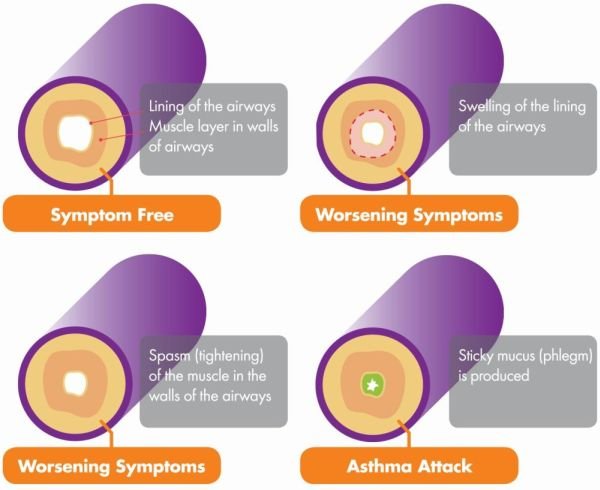Find out more about asthma,the causes, the symptoms and what's happening in your airways.

What is Asthma?
Asthma is a condition that affects the airways- the small tubes that carry air in and out of the lungs. In asthma, the airways become over-sensitive; meaning that they react to things that wouldn’t usually cause a problem, such as cold air or dust.
When the airways react to a substance, the muscles of the tube walls tighten up, making them narrow and leaving little room for air to flow in and out. The lining of the airways then gets swollen (just like your nose during a cold) and sticky mucus is produced which clogs up the breathing passages.
With so little space in the airways, it becomes difficult for air to move in and out and the chest has to work much harder to breathe. Tightening of the muscles around the airways can happen quickly; this is the most common cause of mild asthma symptoms.
Thankfully, this tightness can be relieved quickly with a reliever inhaler (usually blue). However, the swelling and mucus happen more slowly and need a different treatment. This usually is usually a preventer inhaler which is taken daily to allow the effect to build up over time.
The majority of people with asthma are prescribed a daily preventer inhaler to protect against an asthma attack and a reliever inhaler to use when symptoms occur. It is extremely important that preventer medication is taken regularly, as prescribed and even when asthma symptoms are not present.
The Airways

What causes Asthma?
We still don't know the exact cause of asthma, but we do know that:
-
Anyone can develop asthma but it is particularly common in Ireland, where over 380,000 adults and children have the condition.
-
Asthma often begins in childhood but it can start at any age.
-
Asthma runs in families e.g. if you have parents or brother and sisters with asthma then you are more likely to have it yourself.
-
If you or your family members have hay fever or eczema you are more likely to develop asthma.
-
Adult onset asthma can develop after a respiratory tract infection (colds, flu, chest infections).
-
It's thought that modern changes to housing, diet and cleanliness may have contributed to the rise in asthma over the last few decades
-
Asthma is not infectious.
-
Smoking during pregnancy or exposing a child to tobacco smoke will increase their risk of developing asthma.
-
Being overweight increases the risk of developing asthma.
-
Some children lose their symptoms as they grow older but asthma is a chronic disease so it never goes away and symptoms can come back later in life.



